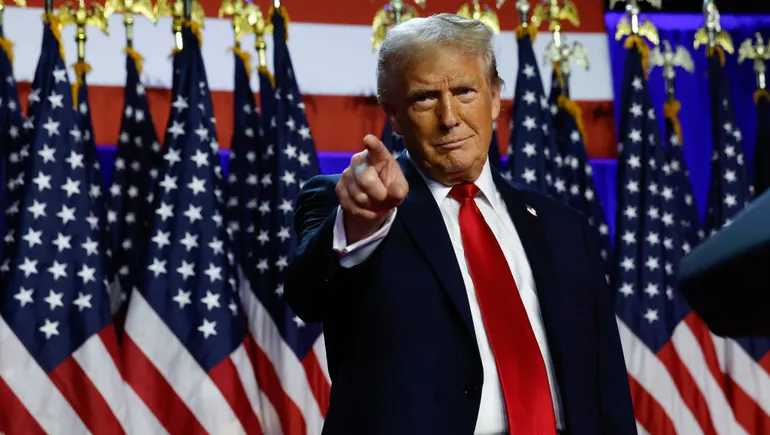As companies look to 2025, the healthcare sector faces one glaring question: What does President-elect Donald Trump’s return to the White House mean for the industry?
All of healthcare will be affected in some way by Trump’s second presidential term. However, the effect on the medical device industry specifically may be a little more nuanced than that of providers and pharmaceutical companies, which face several more high-profile issues.
“There are no major things on the agenda,” said Shagun Singh, an RBC Capital Markets analyst. “I’ve been getting a lot of questions on positioning within healthcare, and medtech is probably one of the best sectors in terms of relative positioning. … At a high level, [there’s] nothing negative that concerns me.”
Still, there are key topics device companies will need to watch when Trump takes office on Jan. 20, including the administration’s favorability to M&A, the threat of tariffs on China and other countries, and how unconventional agency leaders could shape the industry.
M&A
Device companies have been on a spending spree for much of 2024. The list ranges from multi-billion dollar buys from Johnson & Johnson and Boston Scientific to smaller acquisitions by Edwards Lifesciences and Stryker.
After a busy year of M&A, analysts and industry experts are now weighing whether there could be even more activity in 2025.
“M&A is the lifeblood of medtech,” Singh said. “I think that’s going to continue.”
Singh added that the Trump administration could be more lenient toward companies looking to create value through M&A, compared with the Biden administration, which has been “a little bit more aggressive.”
While Boston Scientific was one of the top spenders in the device industry so far this year, the company also saw its two largest deals held up during federal review — its $3.7 billion purchase of Axonics took more than 10 months to close.
John Babitt, a partner at EY, said companies have “absolutely” put off deals under the Biden administration due to the threat of longer review timelines, which can increase legal costs and add risk to the process.
“To have a year between signing a deal and closing a deal — it just introduces an element of risk to the integration,” Babitt said. “Frankly, we had clients who just said it’s not worth it. … There’ll be a different set of calculus that’ll be applied going forward.”
There are still questions about how M&A is viewed once Trump takes office, Babitt added, but “most people generally feel that there will be a little bit more latitude to actually get deals done — and get them done on a timely basis.”
Trump & tariffs
A potential increase in tariffs on imported goods could directly affect device companies’ financials. Trump threatened during the election to increase tariffs on China to 60%, and he later threatened to enact 25% tariffs on imports from Mexico and Canada.
Trump reaffirmed his stance on tariffs in an interview with NBC News that aired Sunday.
Siemens Healthineers and Medtronic, which hosted earnings calls after the Nov. 5 election, were questioned by analysts about how exposed their businesses were to potential tariffs on China under Trump. Both were confident that they would not see a substantial effect. However, companies across the sector could face challenges.
Any company that’s importing components and raw materials into any of their manufacturing processes is going to have an element of exposure, Babitt said.
“M&A is the lifeblood of medtech. I think that’s going to continue.”

Shagun Singh
RBC Capital Markets analyst
Babitt outlined three factors that could challenge companies in the coming years: tariffs when importing from China, retaliatory tariffs for shipping products into China, and increased tariffs in other jurisdictions outside of the U.S., where many medical device companies have manufacturing operations.
EY is getting the most questions and uncertainty from clients around the third factor, Babitt said, adding that Mexico, Costa Rica, Vietnam and Malaysia are countries where device companies could see additional tariff pressure.
J.P. Morgan analysts in a late November note to investors wrote that the “good news so far is that MedTech is not politically sensitive, has broad bipartisan support at home with strong ties to both Democrat and Republican states, and is globally dominated by US-based companies.”
It’s too early to know how tariffs could challenge business next year for several reasons, they added. First, Trump could use the threat of tariffs as a negotiating tool, as he did in his first administration, and there is still time for countries to negotiate before the inauguration. Canada’s prime minister and Mexico’s president have already separately met with Trump.
Second, Trump could enact tariffs on select goods, rather than an “all-encompassing tariff on certain countries.” Finally, the J.P. Morgan analysts wrote that short-term impacts could be hard to avoid. However, companies could use several strategies to reduce or avoid a hit from tariffs in the medium term, such as re-evaluating the countries where final assembly takes place and utilization of foreign trade zones.
CDRH leadership
Leadership changes always bring questions for industry when the White House changes hands. Trump has already selected several non-traditional leaders to run federal health agencies. The president-elect nominated Robert F. Kennedy Jr. and Mehmet Oz to lead the Department of Health and Human Services and the Centers for Medicare and Medicaid Services, respectively.
Meanwhile, Trump picked Martin Makary to lead the Food and Drug Administration, which houses the device industry’s direct regulator, the Center for Devices and Radiological Health. Makary, who some see as a more traditional pick than either Kennedy or Oz, is a Johns Hopkins surgeon and researcher. However, there are still questions about whether there could be leadership changes in divisions within the FDA.
Michelle Tarver officially took over as director of the FDA’s device center in October after serving as acting director for several months. Tarver has already laid out her vision for the CDRH and has been embraced by the industry. An FDA spokesperson declined to comment on Tarver’s future, adding that the center will continue the mission to protect and promote public health.
A new president has not historically meant there’ll be a leadership shakeup at the CDRH. Jeff Shuren, Tarver’s predecessor, served under three presidents — former President Barack Obama, Trump and President Joe Biden — and remained the center’s director for 15 years.

Michelle Tarver, then acting director of the FDA’s Center for Devices and Radiological Health, speaking at Advamed’s The Medtech Conference on Oct. 17, 2024. Tarver was named as the CDRH’s permanent director shortly after the event.
Elise Reuter/MedTech Dive
Michael Abrams, a senior researcher at the patient safety watchdog Public Citizen, said there are several big topics the CDRH needs to focus on, such as artificial intelligence, racial bias in pulse oximeters and industry influence over the agency via user fees. Health leaders like Kennedy, if confirmed, could determine how the center acts in those areas, but device regulations may not be high-profile enough to be affected.
“[Kennedy] may never get down to the CDRH stuff,” Abrams said. “But he should. Or maybe it’ll give Michelle Tarver the opportunity to actually do what she needs to do — sort of unimpeded, sort of under the radar.”
Medical device companies will likely also be watching how Oz could shape the CMS if confirmed, as the agency determines whether Medicare will cover new treatments and technologies. Oz, a surgeon before becoming a TV and public personality, has a history with the medtech industry as an inventor of Abbott’s Mitraclip heart device.
LDT rule’s ‘messy’ future
The FDA’s final rule for laboratory developed tests may be the most significant, and timely, medical device regulation that could face uncertainty under the new Trump administration.
The rule, which increases the FDA’s authority to regulate LDTs, has been one of the year’s biggest stories. Shortly after the agency unveiled the final draft in April, the American Clinical Laboratory Association sued to block the rule from taking effect, and the Association for Molecular Pathology followed a few months later.
The regulation’s future is now dependent on the timing of the lawsuit and whether the FDA chooses to enforce the rule under the Trump administration if it’s upheld.
Jeff Gibbs, director at Washington, D.C.-based law firm Hyman, Phelps & McNamara, said the future of the rule is “complicated and messy.” Gibbs, whose firm is representing AMP in the case, said the lawsuit should be fully briefed by the end of December, and then the court will be free to issue a decision.
The timeline could get complicated, however. For example, if the court decides it would like oral arguments, it could still issue a decision before the Jan. 20 inauguration date or rule after, Gibbs explained. The court could also wait and ask how the Trump administration would implement the rule.
If the court rules against the regulation, making the rule invalid, the Trump administration could decide to not appeal and let the court’s decision take effect, Gibbs said.
Gibbs also explained that there are two main paths the FDA could take to override the rule if the court upholds it: The FDA could simply not enforce the rule, though that leaves the possibility of enforcement by a future administration, or the agency could go through the rulemaking process to reverse the regulation, which is a complicated route and takes time.
The Trump administration does not have much time to decide on its position or future steps because deadlines are quickly approaching. Under the rule, the new LDT regulations will be phased in over four years, beginning in May 2025.
“We do have this May 6 deadline looming. Thousands of labs across America have to decide what to do before May 6, if they’re going to comply,” Gibbs said. “Unless either the court stays it or strikes it down, or the Trump administration acts — at least in theory — the labs would be vulnerable to enforcement action if they don’t meet the requirements.”

